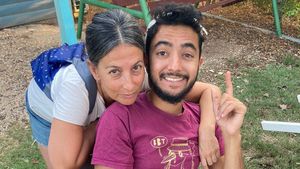Brazil has been embroiled in political turmoil since the narrow victory of left-wing candidate Luiz Ignácio Lula da Silva over far-right incumbent Jair Bolsonaro in October 2022. The aftermath of the election saw not only deep divisions within the country but also significant unrest as Bolsonaro's supporters refused to accept the election results. This unrest reached its peak on January 8, 2023, when thousands of pro-Bolsonaro activists stormed the Brazilian Congress, the Supreme Court, and the presidential palace, calling for military intervention to oust Lula. The chaos resulted in extensive damage to the buildings, akin to the Capitol riots seen in the United States just two years prior.
Police responded to the events of January 8 by arresting around 1,500 rioters, but investigations continued as authorities sought to assess the underlying conspiracy and its orchestrators. Recently, the situation escalated as Brazilian authorities moved to formally accuse Bolsonaro and his allies of plotting to overthrow the government. Federal police presented evidence of what they termed a criminal organization aiming to preserve Bolsonaro's power, leading to significant legal repercussions for the ex-president.
On October 25, Brazil's federal police announced the indictment of Bolsonaro along with his former vice-presidential candidate Walter Braga Netto and 35 others for their roles in allegedly attempting to violently dismantle democratic governance. This indictment followed nearly two years of investigation triggered by Bolsonaro's persistent and unfounded claims of electoral fraud, which he alleged undermined the integrity of the elections.
Bolsonaro, through his social media, responded defiantly, labeling the inquiry as unjust and claiming it falsely targeted him. His exact words were, "I will mount a legal fight against these claims, as the investigators are being 'creative' and doing 'everything the law does not say.'" Bolsonaro, along with his former high-ranking officials, faced severe scrutiny as the police report indicated actions by the group conspired to disrupt the democratic electoral process.
Meanwhile, the chaos surrounding Lula's election official and the subsequent coup attempt has led to numerous arrests and accusations. Just days before Lula's inauguration, Brazilian authorities apprehended five individuals suspected of plotting to assassinate him. This attempt to protect the incoming president from possible violence reflects the extreme measures some factions were willing to take amid Brazil’s volatile political climate.
Fast forward several weeks, and the political aftermath continues to thicken. Braziilian police announced they arrested Joelton Gusmao de Oliveira, accused of involvement in the attempted coup, during his efforts to renew paperwork as he sought refuge. The 47-year-old, previously sentenced to 17 years for his participation, found himself at the center of international legal complications as Brazil seeks his extradition from Argentina, which has recently tightened its laws on granting asylum to individuals charged with serious crimes.
It is glaringly apparent now, as reports disseminate from multiple outlets, including UOL News, which noted Oliveira's timeline explicitly. It pointed out how his visit during such politically charged times was not just innocuous but fraught with danger and indicative of the larger issues Brazil faces with extremist factions still active.
Critics of Bolsonaro labeled his party's actions as terrorist activities, categorizing the attempted coup as more than just rebellious acts, but direct assaults on democracy itself. The dark shadow of January 8 remains as analysts point to the resultant legal burden on Bolsonaro and his inner circle, characterized by investigations concerning incitement to violence and treason.
The growing indictment facing Bolsonaro and roughly three dozen of his co-conspirators has prompted discussions about the future of his political career. Already banned from office for eight years, the current legal actions could preclude any future aspirations to return to power. His supporters, holding onto hopes of his political restoration, have been met with significant legal obstacles amid these developments.
The revelations also draw attention not just to Brazil’s internal strife but raise questions about the role of law and order in democratic societies. What happens when the will of the people is undermined by those meant to protect it? Such existential questions linger as Brazil navigates through this dark chapter. The investigations are far-reaching as they police efforts to root out kindred spirits of Bolsonaro's regime from both past and present. With each arrest, the window narrows on the potential for violent upheaval, as officials work to legitimize Lula’s presidency and restore peace.
The urgency for restoring stability cannot be understated as the Brazilian government grapples with dissent. Meanwhile, Lula’s administration faces its own challenges, from economic recovery to bridging the gaps left by previous governance.
The saga continues as it plays out before the eyes of the world, drawing attention not merely because of its chaotic nature, but also its direct implications on voter trust and political engagement around democratic processes. Brazil stands at the brink of either repairing or dismantling the trust between its citizens and their institutions, as the potential for future electoral violence remains not just theoretical, but increasingly reflective of lived realities witnessed on January 8.
While Bolsonaro may have retreated to the sidelines for now, the legal ramifications of these proceedings will dictate the future political climate for years to come. The burned images of the January riots still resonate for many, painting the actions of the few as representative of deep-seated frustrations stitched across the societal fabric. Legal battles loom large as upcoming decisions by the top prosecutor will determine the list of charges aimed at Bolsonaro’s accused conspirators, continuing to shape Brazil's path forward.



